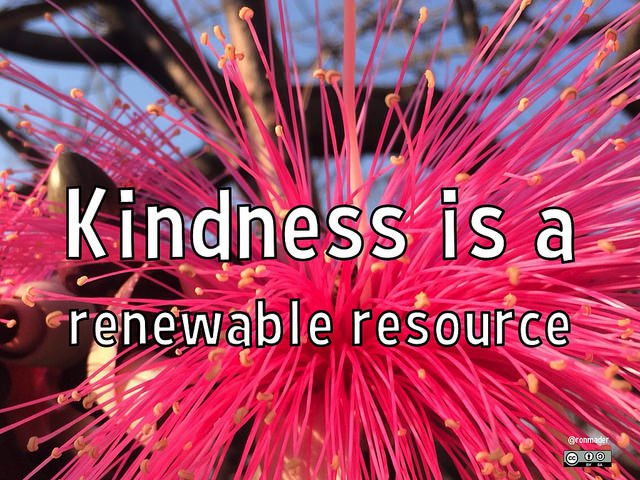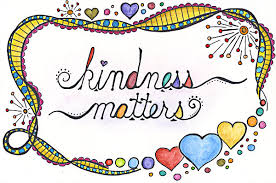The benefits of kindness are being welcomed since the global economic crisis and findings that more altruistic methods of doing business can be rewarding for all.
‘Forget Survival of the Fittest: It Is Kindness That Counts.’
As long as greed and selfishness are stronger than kindness and selflessness, there will always be suffering and pain
‘So much of what we value is in fact preserved by kindness and is compatible with it. We can be kind and successful, kind and exciting, kind and wealthy and kind and potent. Kindness is a virtue awaiting our rediscovery and our renewed, un-conflicted appreciation.’- The Book of Life
If we want to see a new global economy built on fairness, kindness, justice and sustainability then we must use the language and assemble the alliances necessary to provide the political momentum for our vision to be both imagined and realised. This, in a nutshell, is the intent of this Blog.

Photo:Flickr/Ron Mader. CC BY-SA 2.0.
There is no secret that, people feel uncertain and negative about the future, perhaps even more troubling is the lack of power they feel to shape it. In a recent poll for the Hansard Society for example, 47 per cent of British people felt they had no ability to influence the national agenda. In the US, 48 per cent of people don’t have confidence in politicians to deal with future challenges, and equally concerning is the declining faith in democracy among young people.
But, we must not despair. There is one unifying value, KINDNESS, that can bring us together, brightening our path and inspiring us to build a better, fairer and kinder world, enabling us to shape the future we want.
The Transformational Power of Kindness to Build a Better and more Fulfilling Life: Be Kind to Yourself, Be Kind to Others. You reconcile all beings in the world: Kindness to Make the World Great Again
‘Kindness is the language which the deaf can hear and the blind can see’-Mark Twain
At GCGI we recently celebrated World Kindness Day: Today is World Kindness Day: Embracing Kindness to Defeat the Political Economy of Hatred
Since then, I have received many positive and encouraging comments about the beauty, wisdom and relevance of kindness in our daily life, making it more fulfilling and meaningful.
Given this, I decided to further my reflection and move beyond the spiritual /philosophical and religious aspects of kindness and what it means to be kind, to economic considerations of kindness and what it means to have a kind world.
I hope what I discovered, which I have briefly noted below, will encourage and inspire you, as it has done for me, to firmly believe that, yes, indeed, it is possible to simultaneously build a world based on sound economic foundations, with material well being, but also with spiritual health, hand in hand.
A Must Read Book about how Adam Smith can change your life for the better
Adam Smith and the Pursuit of Happiness
Imaging a Better World: Moving forward with the real Adam Smith
“Spiritual health and material well-being are not enemies: they are natural allies.”- E. F. Schumacher
If you want to fix something you must know what is broken

Photo:umairhaque.com
Neoliberal Economics (Neoliberalism) has Broken The World —and Economics of Kindness is the only solution to fix the tragedy of this wanton destruction
You don’t have to look very far to see it. The economy, democracy, society, and the planet are breaking and a rising movement is calling for kindness as a remedy for systems on the brink.
Why do people do good things? Is kindness hard-wired into the brain, or does this tendency arise via experience? Or is goodness some combination of nature and nurture?
EMBRACING CHANGE TO BE KIND

Embracing change can be a good thing: Change helps you grow, Change teaches you to be flexible, Change can challenge your values and beliefs, Change reveals your strengths, Change makes you more compassionate and kinder, Change breaks up routines, Change offers opportunities. Photo& Quote Credit
Conscious consumption is becoming the new normal when doing business. Making sure your business is doing the right thing will help set you apart and take advantage of the Kindness Economy.
THE KINDNESS ECONOMY
‘A great brand that provides products or services people need but in a responsible way will do well. Brand is not just about your logo and identity and how you talk to your customers. To make it in the current economic climate brands have to be ethical, sustainable, resource focused and play a responsible role in the community. Your customers are demanding businesses to help them live responsibly. The choices they make about the food they eat, the products they buy for their home and how they entertain their families have to make them feel like they've made good choices that make them happy when they talk about them. Today businesses have to be transparent in everything they do. And it's not enough to talk about how much your business recycles. Your brand has to demonstrate its "positive" credentials in everything it does to gain customer confidence. That means sourcing, production, people, sustainability and delivery all need to be "kind" to be a business customers want to use.’- Stephen Moore Marketing
A Businessman and an Economist in Dialogue for the Common Good: Dubai 2004
Fat Cats: An invitation to dialogue
“Before we can build the world we want to live in, we have to imagine it.”
Can we forge a society built on shared values, one that respects difference? Can we build a State that cares, not purely in a macroeconomic context, but at a personal and individual one? Can we find space for kindness against a backdrop of complexity and cost, where we have allowed compassion to be viewed as a luxury for the charitable rich? Can we nudge people to behave altruistically? Can we build a view of society that is built not from the extremes, not from saints and sinners, but through the everyday kindness of action, by state, by organisation, by individual? Can greed be transformed into generosity, selfishness to selflessness, hatred to kindness,...,? Can we alter policies and practices to make the world a kinder place?
Moreover, can we come together and in the interest of the common good, begin to imagine a different world, a kinder world?
Imagining the World We Want
Imagine a political system that puts the public first. Imagine the economy and markets serving people rather than the other way round. Imagine us placing values of kindness, respect, fairness, interdependence, and mutuality at the heart of our economy. Imagine an economy that gives everyone their fair share, at least an appropriate living wage, and no zero-hour contracts. Imagine where jobs are accessible and fulfilling, producing useful things rather than games of speculation and casino capitalism. Imagine where wages support lives rather than an ever expanding chasm between the top 1% and the rest. Imagine a society capable of supporting everyone’s needs, and which says no to greed. Imagine unrestricted access to an excellent education, healthcare, housing and social services. Imagine hunger being eliminated, no more food banks and soup kitchens. Imagine each person having a place he/she can call home. Imagine all senior citizens living a dignified and secure life. Imagine all the youth leading their lives with ever-present hope for a better world. Imagine a planet protected from the threat of climate change now and for the generations to come. Imagine no more wars, but dialogue, conversation and non-violent resolution of conflicts. Imagine a world free of corruption!
This is the country and the world I wish to see and I believe we have the means to build it, if we take action in the interest of kindness for the common good.
Why the Economics of kindness is the key to a new and better world, a world free of the selfishness of neoliberalism
In my search to answer this timely question, I came across two wonderfully kind answers: I read and read them again, and thought that I could not better them. And there you have them!
Opinion: An economics of kindness
Rt Hon Jacinda Ardern
Prime Minister, New Zealand

Photo:Jacinda Ardern: Politics And Economics To Focus On Empathy, Kindness and Well-Being
Rejecting protectionism, New Zealand Prime Minister Jacinda Ardern says her country hopes to lead the world with a new economic approach built on improving people’s wellbeing.
'There’s a phrase often used to describe New Zealand. Even though we are a tiny country thousands of miles away from almost everywhere, we punch above our weight.
Ours was the first country where all women won the right to vote back in 1893. In 1938, we were one of the first to introduce a cradle-to-grave social welfare system that endures in some form to this day.
This tendency to push boundaries also means we are sometimes the first to learn valuable lessons. Starting in 1984, New Zealand went further and faster than nearly any country in embracing the prevailing neo-liberal economic experiment. We slashed the top tax rate, dramatically cut public spending, removed regulations that were said to hamper business, and vastly reduced welfare benefits paid to the sick, those caring for children and the unemployed.
Economists and policymakers in many other countries pointed to New Zealand as a poster child for market-based reforms which were all too frequently accompanied by abrupt cuts to the social safety net.
Within 20 years, my nation lost its status as one of the most equal countries in the OECD. While incomes at the top doubled and gross domestic product grew steadily, incomes at the bottom stagnated and child poverty more than doubled. Some citizens were richer in cash, but the country was poorer in many other ways.
I was a child back then, but the consequences of this shift are etched into my memory and my politics. Kids in the small rural town I was living in at the time weren’t born into a decade of hope and opportunity, but one of inequality where users had to pay for basic services.
This experience wasn’t limited to New Zealand. It happened in many countries. Around the world, there is now increasing frustration over economies that see disproportionate benefits go to one group, and leave others behind. They are not only perpetuating unfairness but also hampering their overall growth potential and, increasingly, posing a threat to our democracies.
We have seen politicians and governments of all stripes respond to such disparities by rejecting the institutions and global systems that are believed to have produced it. I see how we reached this point, but I reject the idea that the only alternative is isolationism and the abandonment of global institutions.
We don’t need to start again, but we do need to change the way we do things. In May, my government will present the world’s first “wellbeing budget”. This is not a concept we came up with ourselves. The OECD and the IMF have, for a while now, have urged countries to look beyond a strong balance sheet and a strong economy to redefine success. We must focus specifically on living standards and human, social, and natural capital when we set targets and track progress. In our next budget, we will set five priorities each deliberately focused on long-term intergenerational change.
As an example, one priority will be to support the mental wellbeing of all New Zealanders, with a special focus on under 24-year-olds. From a purely economic perspective, there are clear benefits to supporting positive mental wellbeing including as enhanced productivity. From a kindness perspective, the modern age places huge stresses on young people, which affects their ability to live full, meaningful lives. Confronting this will make us a better country.
This isn’t woolly but a well-rounded economic approach — the same kind we will use to confront the challenges posed by climate change, digital transformation, social exclusion, poor health, housing and domestic violence. As leaders, we should not be afraid to reject the status quo, especially when an entire generation is doing just that.
At a time when the international rules-based order is under strain, when leaders around the world are grappling with understandably dissatisfied constituencies, I hope this wellbeing approach could provide a model which others in turn might look to. I wholeheartedly believe that more compassionate domestic policies are a compelling alternative to the false promise of protectionism and isolation. Now we have a chance to prove it.
But change of this scale requires us to look beyond three and four year electoral cycles. We must accept that the race to grow our economies makes us all poorer if it comes at the cost of our environment, or leaves our people behind. It requires what in the Māori language is called kaitiakitanga, or guardianship.
We in New Zealand hope to, once again punch above our weight by forging a new economic system based on this powerful concept — one that is successful, but one that is also kind.'- This article was originally published by the Financial Times on 22 January 2019.

'Kindness unites. Kindness inspires. Kindness heals. Kindness brings joy. Kindness is freedom. Kindness gives life. Kindness is unconditional. Kindness feels good. Kindness aligns us with universal harmony.'- Photo&Quote
‘Does being kind have any role to play in achieving real and lasting gains in social and economic justice?
Does kindness matter?
‘Like spraying water on a spider’s web, research reveals the taken for granted infrastructure of human relationships.’
Zoe Ferguson, via openDemocracy
‘Does being kind have any role to play in achieving real and lasting gains in social and economic justice? At first sight it sounds unlikely. Kindness is so soft a virtue and injustice is so hard. Individual acts of love and compassion are no substitute for removing centuries of structural oppression.
But after a year of working with seven organisations in different communities in Scotland with a team supported by the Carnegie UK Trust and the Joseph Rowntree Foundation, I’m convinced that kindness lies at the heart, not only of our ability to generate wellbeing but also to strengthen the foundations on which the power for change can be built. Here’s the argument in a nutshell:
Kindness makes people’s lives better, but just encouraging individuals to be kinder to each other has significant limitations. Therefore, we have to transform the social, economic and political structures that inhibit our ability to act in kindness, and at the same time strengthen the links between these actions and our aspirations for greater social and economic justice.
That may sound simple, but researching these issues is like spraying water on a spider’s web, making visible the taken for granted infrastructure of relationships that makes a significant impact on the quality of our lives.
We know that resilient individuals have at least one strong emotional attachment, along with access to wider support and positive community experiences, so there’s a well-documented association between strong social ties and lower adult mortality. A recent meta-analysis shows a 26 percent increase in the likelihood of death when measured over an eight year period as a result of loneliness, irrespective of a person’s age. In an increasingly virtual world, we still live in real houses on real streets, and rely on direct contact with real people to make our lives work.
As part of our research we spoke to many of these ‘real people,’ who talked eloquently about what kindness means to them in the film that accompanies our report. One of them, Hannah, spoke about kindness in terms of “sharing, trust, encouraging and being gentle with each other;” another, called Angela, described it as “a true opening of your heart, true belief in the talents, abilities and love that everyone can share.”
When we spoke to customers at the Tesco supermarket in Maryhill, Glasgow, we found that many isolated older people were shopping every day or so in order to break up their day with at least some form of human interaction. When asked if they took part in activities or groups to meet other people, many of those we spoke to said that they didn’t like anything that was formally organized; they would rather have a good neighbour than someone who is paid to spend time with them, or even a volunteer.
But kindness is also difficult, especially given the pressures of living and working in contemporary capitalist societies where altruism and compassion often have to be rationed, or are actively discouraged. Talking to older people in particular, it was striking to hear how far their notion of ‘neighbourliness’ extends beyond what would nowadays be considered ‘normal.’
For example, Maureen and Isabella—two residents of Maryhill—talked fondly of their past experience of tenement life in Glasgow, sharing childcare and chores and taking meals to older neighbours. The creation of the welfare state relieved some of those obligations and provided vital services at a time of national crisis, but social needs have multiplied and expectations have since been raised.
Alongside changes in family structures and growing geographic mobility, these developments have weakened some of the bonds that held communities together. We found that—whilst people understand the economic and social shifts that underpin these changes—they still miss a sense of that older community spirit. In many cases however, people said that fixing this problem ‘was someone else’s job.’
Looking for evidence of ‘what works’ in creating kindness revealed a mismatch between what we wanted to explore—relational experience in communities—and the existing body of research and policy studies that focus on the transactional, the evaluation of interventions which assume that success depends on formal institutions.
This pattern—identify a problem and then task or create an organisation to find the solution—is common in the social policy field, but nurturing the values of community and caring for each other isn’t something that can be achieved through top-down, bureaucratic action. We’re not going to find the answers in services, programmes or projects, but at a much deeper level in the humanity of individuals, and how to let that humanity grow and flourish.
For example, one of our respondents (called Margaret) wore a ‘Friendly Dumfries’ badge to indicate that she was someone who was happy to have a chat. She found that wearing the badge made her think about her role and presence in helping to strengthen community. Other respondents talked about creating welcoming places and informal opportunities to get together and explore what kind of society or neighbourhood people want to live in. Simple steps like these can help to create the conditions for greater kindness in communities.
But equally important is finding out what gets in the way of kindness, and acting to remove those barriers beyond the level of the individual. Part of the problem is that many of those we talked to saw greater risks in altruistic action than in previous decades. As a result, they are increasingly likely to seek out more formal routes to be helpful in their communities through established charities, as opposed to through their individual interactions with each other.
Shug, for example, a community worker in Kircaldy, suggested a weekly kickabout in a local park with kids and their parents. He went ahead and put the idea into practice, but after a couple of weeks he was challenged by the local authority to produce his ‘risk assessment’ paperwork and identify a ‘lead for child protection.’ In this case, regulation, or perhaps more accurately our current interpretation of what regulation means, is getting in the way of encouraging more opportunities for people to come together and express their care and attention for each other informally; the official structures of caring form a barrier to ‘unofficial’ kindness.
Intuitively it might make sense to conclude that if we care more actively for each other in communities then we place less pressure on overburdened public services, but this doesn’t necessarily lead to greater empowerment in communities, still less to broader social change. So what is it that connects kindness to social transformation?
In Tesco Maryhill for example, individual caring connects with community empowerment because checkout staff have taken the time to get to know their isolated customers, talking with them, helping to build their confidence, and nudging them to join local groups, as well as raising money and volunteering for community projects like after school clubs where kids get a healthy snack and help with homework, community gardens and cooking projects.
There was much less recognizable agency involved in the Cook Club in Moredun in Edinburgh, where people (often facing severe difficulties) come together once a week to prepare and share food with one another. Individual kindness is clearly evident in Moredun, but it is limited in challenging the underlying factors that produce adverse childhood experiences, poverty, deprivation, neighbourhood hostility, addiction and inadequate responses from the state.
The best results seem to come from mutually-reinforcing relationships between structures and individuals, as, for example, when TESCO’s corporate policy in Maryhill was changed to give permission to staff to become more active in community engagement. Whilst kindness is obviously not sufficient in itself, it seems to be a necessary element in creating the power for positive change.
It’s difficult, though, to talk about kindness at all in a public policy context. These conversations are uncomfortable, and kindness sometimes feels too soft or too glib in contrast to other, more formal and more recognised approaches to social research and social policy. However, it has been liberating to have so many conversations about something that everyone can connect with, and to become explicitly involved with the work both intellectually, and personally and emotionally.
Our conversations with Maureen and Isabella and Margaret and Shug and all the others show that we can all talk about kindness, and talk about it in ways that are powerful both personally and politically. That universality of understanding matters if we are to affect social change for the good, rather than merely providing superficial solutions through social services.’- Read the original article HERE
Zoe Ferguson
Zoe has 20 years experience in public policy in Scotland in roles spanning research, analysis and policy, most recently as the Chief Social Researcher at the Scottish Government. She has worked across a wide range of policy areas including, education, lifelong learning, work, regeneration, economic development, culture and public service reform. Since leaving the Scottish Government in 2015 she has worked with Edinburgh Cyrenians, a charity which supports people excluded from family, home, work or community, to develop strategic direction and was a founding board member of the What Works Centre for Wellbeing, an independent research centre with a UK wide remit to improve wellbeing through the use of evidence.
Related articles:
People’s Tragedy: Neoliberal Legacy of Thatcher and Reagan
The Destruction of our World and the lies of Milton Friedman
Economic Growth: The Index of Misery
The Journey to Sophia: Education for Wisdom
What might an Economy for the Common Good look like?
What is this life all about?
Why am I here? What’s my Life’s purpose? How can I make the most of my Life?

